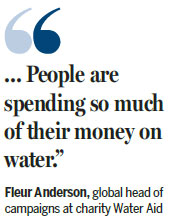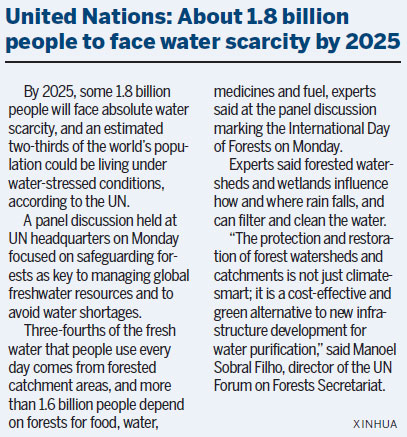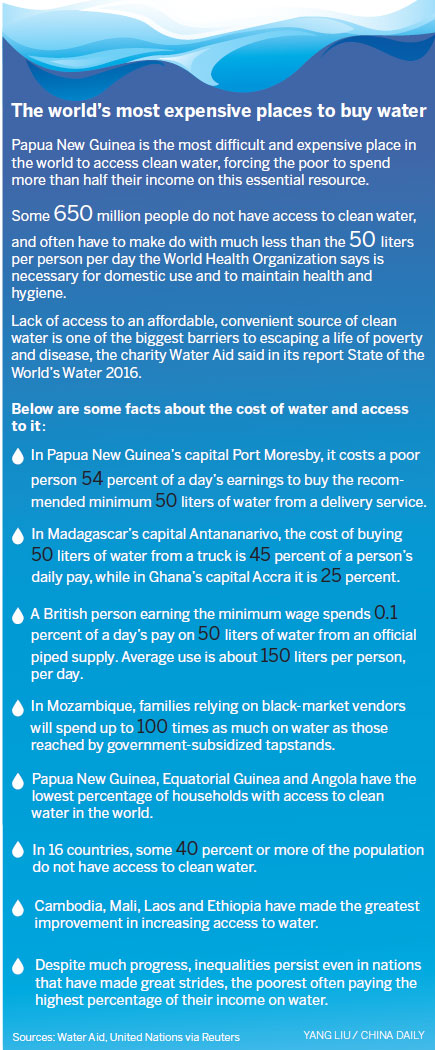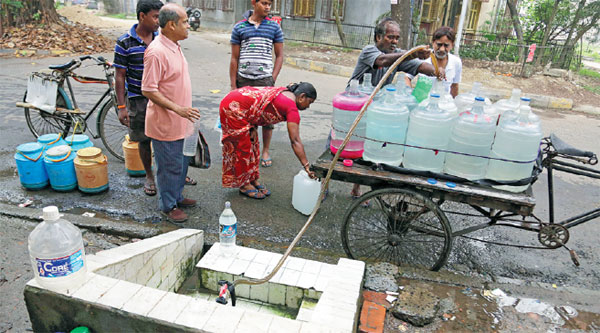Shortages threaten jobs, growth worldwide
Updated: 2016-03-23 08:28
By Agencies in London and New Delhi(China Daily)
|
|||||||||
India has the most people without clean water, says new report
An estimated three out of four jobs globally are dependent on water, meaning that shortages and lack of access are likely to limit economic growth in the coming decades, the United Nations said on Tuesday.
About 1.5 billion people - half the world's workers - are employed in industries heavily dependent on water, most of them in farming, fisheries and forestry, the UN World Water Development Report 2016 said.
"There is a direct effect on jobs worldwide if there are disruptions in water supply through natural causes, such as droughts, or if water doesn't get to communities because of infrastructure problems," said Richard Connor, the report's editor-in-chief.
Research has shown investment in small-scale projects providing access to safe water and basic sanitation in Africa could offer a return equivalent to almost 5 percent of the continent's economic output.

In the United States, every $1 million invested in the country's water supply and treatment infrastructure generates between 10 and 20 additional jobs, according to the report.
"Whether it's a water treatment facility or a system to bring water to fields to irrigate, you're not just funding that project," said Connor. "You're creating a multiplier effect: jobs are being created because water becomes available."
In Papua New Guinea, for example, poor people have to spend 54 percent of their day's earnings to buy 50 liters of water, the amount the World Health Organization says a person needs every day for domestic use and to maintain health and hygiene.
India has the world's highest number of people without access to clean water - imposing a major financial burden for some of the country's poorest people, according to the international charity Water Aid. Water Aid says 75.8 million Indians - or 5 percent of the country's 1.25 billion population - are forced to either buy water at high rates or use supplies that are contaminated with sewage or chemicals.
"It means countries are not getting the economic benefits of their working population because people are spending so much of their money on water," said Fleur Anderson of Water Aid.
Demand for water is expected to increase by 2050 as the world's population is forecast to grow by one-third to more than 9 billion, according to the UN.
AP - Reuters
|
Residents gather at a roadside water source to fill containers with drinking water for use at home in Kolkata, India, on Tuesday. The international charity Water Aid says 75.8 million Indians or 5 percent of the country's 1.25 billion population are forced to either buy water at high rates or use supplies that are contaminated with sewage or chemicals. Bikas Das / Associated Press |


(China Daily 03/23/2016 page10)
Today's Top News
Europe ramps up security in wake of Brussels attacks
Series of blasts rock airport, metro in Brussels
Scotland to team up with SinoFortone
China to roll out new five-year plan for energy sector
Russia retrieves data from recorder of crashed plane
Paris attacks suspect wounded in Brussels shootout
China's latest GDP target is attainable: OECD Chief
What makes the middle class tick
Hot Topics
Lunar probe , China growth forecasts, Emission rules get tougher, China seen through 'colored lens', International board,
Editor's Picks

|

|

|

|

|

|







